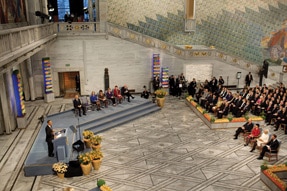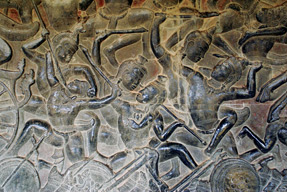Magazine
The Reluctant Warrior

Obama struggles with the painful predicament that haunted Arjun in the Mahabharat.
| In a sober acceptance speech in Oslo in December, Pres. Barack Obama addressed the paradox – and the criticism – of receiving the Nobel Peace Prize while leading wars in Afghanistan and Iraq by arguing that force, however cruel, is nevertheless occasionally “not only necessary, but morally justified.”
The painful truth is, Obama conceded: “I’m responsible for the deployment of thousands of young Americans to battle in a distant land. Some will kill, and some will be killed.”
His moral dilemma is eerily similar to that confronting the warrior Arjun as he prepared to battle his cousins in the Kurukshetra battle, which is related in the Hindu epic The Mahabharat. Arjun pleads with Lord Krishna: “O Krishna, I feel all the ominous signs all over my body, my limbs are aching, my mouth is drying up, and my Gandiv bow is slipping off my grasp…. what will I gain by killing my own uncles, cousins, grandparents, in-laws and other relatives…. I do not want to kill my own kith and kin.” Obama’s rationale in Oslo is that a war is justified “if it is waged as a last resort or in self defense; if the force used is proportional; and if, whenever possible, civilians are spared from violence.” His justifications have compelling parallels in The Mahabharat. In fact, The Gita, the treatise in which Lord Krishna engages Arjun’s moral apprehensions, opens with the words, “dharmakshetre kurukshetre samaveta yuyutsavah” (fighters eager to go to war are arrayed in formations in the battlefield of a just war in Kurukshetra). Let’s evaluate each of Obama’s justifications in turn against the injunctions of one of the world’s greatest war epic. He argues that a war is just when it is fought as a last resort. In The Mahabharat’s dynastic struggle over the throne of Hastinapura, attempts are made to convince Duryodhan and his father, the King Dhritarashtra, to grant Arjun and his other four brothers, who were Duryodhan’s first cousins from his father’s side, half of the kingdom following the prevailing rules of succession. The sage Vyas advised Dhritarashtra, “varyatam sadhu ayam moodhah, shamam gachhatu te sutahb” (stop this foolish son of yours, may he adopt the path of peace). His uncle, the wise Vidur, told the king, “tvam ma druhah pandavan nrip” (O king, do not pick up enmity with Pandavas). Even the queen Gandhari urges her husband to turn against her own son, “tyajatam kulapansanah” (kick this family-lineage destroying son out). The great granduncle, Bhishma, warns Duryodhan, “na chet grahishyate vakyam shrotasi subahun hatan” (if you do not listen to me, many will get killed). Even Yudhishthir, Arjun’s older brother, sends a message, through Sanjay, to the king, “ayuddham vai tat yuddhat gariyah” (it is far better not to go to war than to go to war, who will go to war if there is an option for peace). Finally, Lord Krishna himself makes a last ditch effort to avert war and strike a deal with Duryodhan proposing, “sarvam bhavatu te rajyam panch graman visarjay” (please part with mere five villages for Pandavas in your kingdom). But Duryodhan would not relent to even that modest concession. Only after all the options for a peaceful settlement are exhausted was the dharmayuddha (just war) launched.
Let’s consider Obama’s other preconditions for just wars, i.e. “if the force used is proportional and if, whenever possible, civilians are spared from violence.” The rules for the Kurukshetra war (waged some 3,000 to 5,000 years earlier, according to historians) provided: the horsemen should fight with the horsemen, the elephant infantry with the elephant infantry, the foot soldiers with the foot soldiers, the archers with archers and the charioteers with charioteers – all proportional to each other at every level of the army. The rules of war also dictated: “nishkrantah pritanamadhyat na hantavyah kadachan” (one who has left the army should not be attacked); “samabhashya prahartavya na vishwaste na vihvale” (one who has let his guard down because one trusts the other side and one who is scared of fighting should never be attacked); and “nivritte vihite yuddhe syat priti nah parasparam” (when the battle stops in the evening all warring parties should be friendly with each other). The war rules enjoined taking advantage of the enemy in a wide range of circumstances: “yeken sah sanyuktah prapanno vimukhah tatha, kshinashastro vivarma cha na hantavyah kadachan” (one who is engaged in battling another or one who is seeking shelter or one who is running away from the battle or one whose body armor has been damaged – all these should never be attacked or killed). Reasonable people may debate whether the use of force by the U.S. in Iraq and Afghanistan was proportional to the threat or even whether the country exhausted other options before waging war. But there can be no question about the toll on tens of thousands of civilians in the U.S. strikes in Iraq, Afghanistan and Pakistan. Nor is there any question about the overwhelming technical superiority of the U.S. army over its enemies. Indeed, Mahabharat’s rule matching horsemen with horsemen would be dismissed as insane even under Obama’s enlightened logic. To be sure, Obama inherited both wars, but even he has acknowledged that the Iraq war, which he continues to prosecute, was not one of necessity. However elevated Obama’s soaring rhetoric (“force may sometimes be necessary is not a call to cynicism – it is a recognition of history; the imperfections of man and the limits of reason”), in many areas he surely fails to measure up to the lofty standards of war articulated in The Mahabharat. Perhaps recognizing the contradictions, Obama’s paean to just wars and peace eschewed any mention of the war in Iraq. In the speech, Obama paid tribute to the nonviolent visions of Mahatma Gandhi and Martin Luther King, but also invoked his competing professional obligations: “I – like any head of state – reserve the right to act unilaterally if necessary to defend my nation.” It is a duty acknowledged in The Mahabharat, wherein Krishna tells Arjun, “dharmat hi yuddhat shreyonyat kshatriyasya na vidyate” (for a warrior there is no better law to follow than to go to war), and even taunts him, “klaivyam ma sma gamah” (do not be effeminate). Obama’s war calculus admits “that no matter how justified, war promises human tragedy.” Krishna’s answer to that predicament lies in explaining the temporal transcendence of life through the concept of a time-transcendent Atma (soul): “If you are worried about killing others and, perhaps, getting killed, let it be known to you, Arjun, that this Atma never dies, no one can kill this time transcendent Atma, it is not born, it does not die…. it is always there. Jatasya hi dhruvo mrityuh dhruvam janm mritasya cha (Even if you believe that it dies, then, it will get born again anyway). Your worries about killing others and getting killed are unfounded. So utishtha (get up).” Obama, understandably, cannot invoke such transcendental aspirations, turning instead to earthly ones – “hope for the chance to live out our lives with some measure of happiness and fulfillment for ourselves and our families.” Obama reflected also on the broader character of war in his speech, noting that “war itself is never glorious, and we must never trumpet it as such.” In an interview on CBS 60 Minutes, he added: “I think that one of the mistakes that was made over the last eight years is for us to have triumphant sense about war.” It is a sentiment poignantly expressed in The Mahabharat in the post-war chapter called Shanti-Parva, literally meaning The Peace Chapter. After offering oblations to the deceased, the victorious Pandavas continue to live on the banks of the Ganges for a month, where many great sages and rishis visit King Yudhishthir to offer tribute, consolation and advice. The Mahabharat relates an exchange with the great sage Narad: “O Yudhishthir, by the strength of your arms and by the help of Krishna, you have conquered the earth. By good luck, you have escaped this great slaughter of men. O son of Pandu, after defeating the evil Duryodhan, are you not happy? I hope that grief and lamentation are not afflicting you.” Yudhishthir responds: “O Narad, indeed, I have conquered the whole earth with the help of Krishna and the blessings of the brahmanas and the strength of Bhim and Arjun. There is, however, a pall of heavy grief that is still hovering over my heart. I feel that my own greed has caused this great slaughter of my own kinsmen.” The commander of the losing army, Bhishma, from his deathbed of arrows, counsels a despondent Yudhishthir on his obligations: raj dharma, how to rule ethically, apad dharma, how to behave in difficulty, and moksha dharma, how to attain spiritual freedom. |



You must be logged in to post a comment Login